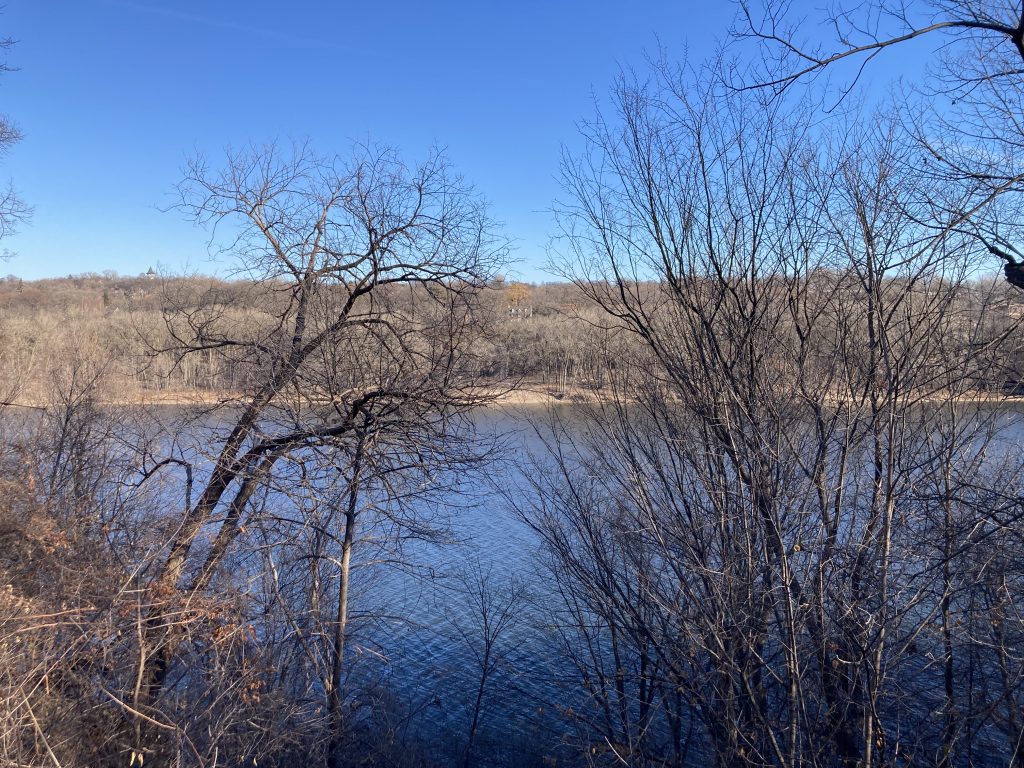4 miles
curved railing (north) and back*
30 degrees / feels like 22
Wow, what a beautiful morning for a run. Sunny and clear and cold, but not too cold. So many shadows to admire! My favorite was the first one I noticed — from a slender tree, so thin it looked more like a pencil line. I started noticing the trees by how thick their shadows were. Then, when I reached the river, I moved onto the shadows of fence posts. The split rail fence above the ravine made such crooked shadows — no straight lines where rails were leaning or bent. The street lamps shadows almost looked menacing — so sharp, stretched across the path. My shadow was sharp too — clear and confident. Saw squirrel shadows but no bird shadows.
10 Things (other than shadows)
- below in the ravine, the water was frozen
- a strange howling call from below at longfellow flats — an animal? or a person pretending to be an animal? I looked, but couldn’t see anyone
- in the sun the darting squirrels looked silver or white
- a stutter step when I squirrel jumped out at me, then turned back
- as I ran south, some white thing out of the corner of my eye kept calling out, notice me! So I did: it was an arch of the lake street bridge
- walking below on the winchell trail, I encountered (not for the first time) the trunk of a tree in the middle of the trail — wide and tall — 12 feet? jagged at the top
- the knock of a woodpecker somewhere below, closer to the river — not sharp, but soft faint, almost an echo
- good morning Dave! / morning Sara!
- looking down at the floodplain forest, I could see many fallen trees and branches
- nearing the bottom of the hill that rises up and out of the tunnel of trees, I saw the bright, burning light of the river far ahead — I knew it was the river, but imagined it might be sky
I listened to strange howls as I ran north, then put it in Merrily We Roll Along as I ran south to home.
Before turning around, I hiked down to the curved fence above the ravine on the Winchell trail and took a few pictures. Then I stood there, looked down at the river, and felt delighted and satisfied, so glad to have gone out for a run this morning and then stopped to take in this view.

I discovered a prose poem this morning that reminds me of my February Feels Like Project. I think it could be inspiration for me as I clean up my draft and try to get it published:
Sunrise, All Day Long/ Kathleen McGookey
Today is wind that smells like mint blowing in from the lake. Today is a paper crane, just folded. Today is a bleached sheet pulled from the linen closet, trailing the delicate scent of green soap. Today is a small brown snail’s pearly trail across the ivy. An eggshell cracked open by raccoon or turtle or fox. Today is a sharpened pencil, a sealed love letter, the antique locket in my mother’s jewelry box. A rectangular pink eraser, straight out of the package. That one black and white bird perched on the sailboat’s mast, preening its glossy tuxedo and singing a boisterous, throaty song.